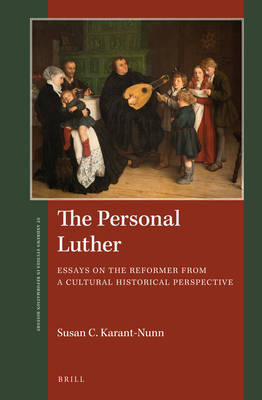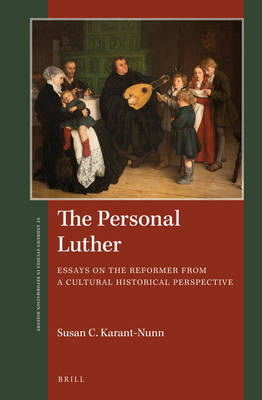
Je cadeautjes zeker op tijd in huis hebben voor de feestdagen? Kom langs in onze winkels en vind het perfecte geschenk!
- Afhalen na 1 uur in een winkel met voorraad
- Gratis thuislevering in België vanaf € 30
- Ruim aanbod met 7 miljoen producten
Je cadeautjes zeker op tijd in huis hebben voor de feestdagen? Kom langs in onze winkels en vind het perfecte geschenk!
- Afhalen na 1 uur in een winkel met voorraad
- Gratis thuislevering in België vanaf € 30
- Ruim aanbod met 7 miljoen producten
Zoeken
€ 193,95
+ 387 punten
Omschrijving
Overwhelmingly, Martin Luther has been treated as the generator of ideas concerning the relationship between God and humankind. The Personal Luther deliberately departs from that church-historiographic tradition. Luther was a voluble and irrepressible divine. Even though he had multiple ancillary interests, such as singing, playing the lute, appreciating the complexities of nature, and observing his children, his preoccupation was, as he quickly saw it, bringing the Word of God to the people.
This book is not about Luther's theology except insofar as any ideational construct is itself an expression of the thinker who frames it. Luther frequently couched his affective utterances within a theological framework. Nor is it a biography; it does not portray a whole life. Rather, it concentrates on several heretofore neglected aspects of the Reformer's existence and personality.
The subjects that appear in this book are meant to demonstrate what such core-taking on a range of mainly unexplored facets of the Reformer's personality and experience can yield. It will open the way for other secular researchers to explore the seemingly endless interests of this complicated individual. It will also show that perspectives of cultural historians offer the broadest possible evidentiary base within which to analyze a figure of the past.
This book is not about Luther's theology except insofar as any ideational construct is itself an expression of the thinker who frames it. Luther frequently couched his affective utterances within a theological framework. Nor is it a biography; it does not portray a whole life. Rather, it concentrates on several heretofore neglected aspects of the Reformer's existence and personality.
The subjects that appear in this book are meant to demonstrate what such core-taking on a range of mainly unexplored facets of the Reformer's personality and experience can yield. It will open the way for other secular researchers to explore the seemingly endless interests of this complicated individual. It will also show that perspectives of cultural historians offer the broadest possible evidentiary base within which to analyze a figure of the past.
Specificaties
Betrokkenen
- Auteur(s):
- Uitgeverij:
Inhoud
- Aantal bladzijden:
- 244
- Taal:
- Engels
- Reeks:
- Reeksnummer:
- nr. 8
Eigenschappen
- Productcode (EAN):
- 9789004348875
- Verschijningsdatum:
- 12/10/2017
- Uitvoering:
- Hardcover
- Formaat:
- Genaaid
- Afmetingen:
- 155 mm x 236 mm
- Gewicht:
- 703 g

Alleen bij Standaard Boekhandel
+ 387 punten op je klantenkaart van Standaard Boekhandel
Beoordelingen
We publiceren alleen reviews die voldoen aan de voorwaarden voor reviews. Bekijk onze voorwaarden voor reviews.









